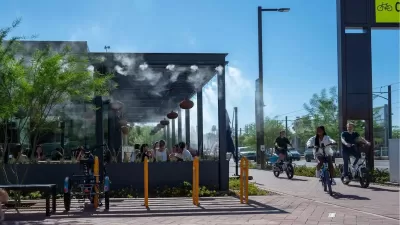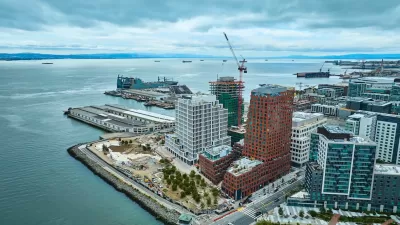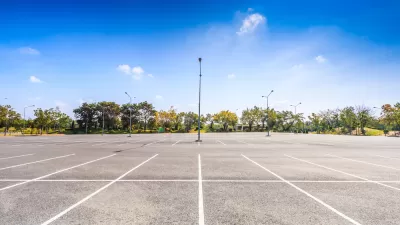Cities plan to cut off individual parking garages is a gamble, says Josie Garthwaite in National Geographic -- yet making it impossible to park is one of the few yet most effective tools that reduces driving.
Though replacing parking stalls for infrastructure that is beneficial for walking, bicycling and mass transit is effective, the action can backfire.
"'On the one hand, a shortage of car parking supply,' can motivate people to get out of their cars and onto the sidewalk or bike lane, Sareco researchers Eric Gantelet and Christophe Begon explained in their report. Yet an imperfect system can also increase traffic congestion caused by circling for on-street parking."
"As Gantelet and Begon noted, if parking is tough to find in a downtown shopping district, people might simply opt to drive out to a shopping mall with a large parking lot instead."
Yet the idea that there is a demand for parking, says Racehl Weinberger, assistant professor of city and regional planning at the University of Pennsylvania, is actually a "demand for access to a location."
"If a private car is the only way to access a given restaurant, shopping center, workplace, or neighborhood, she argued, then "that translates to demand for parking."
"In fact, according to research from the Paris-based firm Sareco, people choose their mode of transportation for urban trips based on the parking conditions at their origin and destination."
FULL STORY: To Curb Driving, Cities Cut Down on Car Parking

Planetizen Federal Action Tracker
A weekly monitor of how Trump’s orders and actions are impacting planners and planning in America.

Maui's Vacation Rental Debate Turns Ugly
Verbal attacks, misinformation campaigns and fistfights plague a high-stakes debate to convert thousands of vacation rentals into long-term housing.

Restaurant Patios Were a Pandemic Win — Why Were They so Hard to Keep?
Social distancing requirements and changes in travel patterns prompted cities to pilot new uses for street and sidewalk space. Then it got complicated.

In California Battle of Housing vs. Environment, Housing Just Won
A new state law significantly limits the power of CEQA, an environmental review law that served as a powerful tool for blocking new development.

Boulder Eliminates Parking Minimums Citywide
Officials estimate the cost of building a single underground parking space at up to $100,000.

Orange County, Florida Adopts Largest US “Sprawl Repair” Code
The ‘Orange Code’ seeks to rectify decades of sprawl-inducing, car-oriented development.
Urban Design for Planners 1: Software Tools
This six-course series explores essential urban design concepts using open source software and equips planners with the tools they need to participate fully in the urban design process.
Planning for Universal Design
Learn the tools for implementing Universal Design in planning regulations.
Heyer Gruel & Associates PA
JM Goldson LLC
Custer County Colorado
City of Camden Redevelopment Agency
City of Astoria
Transportation Research & Education Center (TREC) at Portland State University
Jefferson Parish Government
Camden Redevelopment Agency
City of Claremont





























